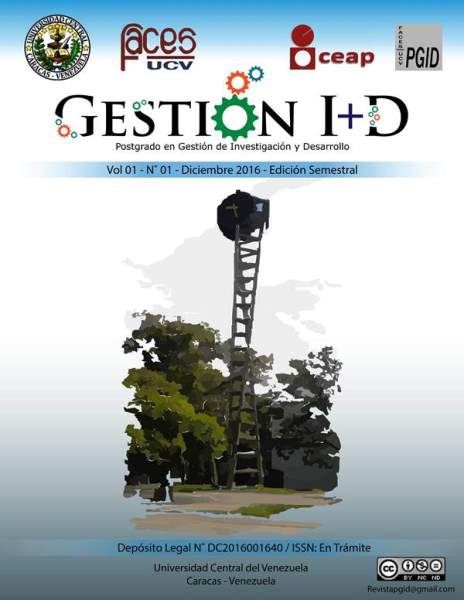Online education as a disruptive innovation In venezuelan universities knowledge management model
Keywords:
Cambio de paradigma, educación online, gestión de conocimiento, innovación disruptiva, universidades venezolanas.Abstract
The factors that have led to the on-line education to be positioned as one of the most efficient methods of knowledge dissemination, since the last decade of the twentieth century, are studied in this paper. The evolutionary advances in Information and Communication Technologies have allowed it to become in today´s highest participation and widespread growth rate distance learning modality, with the lower costs for participants. The methodology applied in this research led to this system of teaching and learning operation and background analysis, comparing their advantages and disadvantages with respect to in site knowledge management procedures traditionally applied in Venezuelan universities. In conclusion, the paper states that online platforms, taught in an open, free, massive and without any discrimination or restrictions determinates the change of paradigm that will define university. education in the immediate future; which would be characterized by the provision of semi-attendance and other fully distance courses with the use of digital media. Among the obtained results this paper positions that training programs in higher education institutions which use the Internet for knowledge dissemination are a model of disruptive innovation that in short and medium term will prevail in the systems of Venezuela university education. This article is framed in the research line entitled: Technological Innovation as a process and sub line of research: Domain Assimilation and Technology; Postgraduate Management of Research and Development - Central University of Venezuela, Faculty of Economics and Social Sciences.Key words: change of paradigm, online education, knowledge management, disruptive innovation, Venezuelan universities.
Downloads
References
Adell, J & Castañeda, L. (2012). Tecnologías emergentes, ¿pedagogías emergentes? Ortega et al. (Edits.). Tendencias emergentes en educación con TIC. (pp. 13-32). Barcelona: Asociación Espiral, Educación y Tecnología.
Bustamante, P. (2005). Tipos de E-learning. Recuperado el 18/agosto/2016 de http://www.e-aula.cl/tipos-de-e-learning/
Christensen, CL. (1997). The Innovator's Dilemma: When New Technologies Cause Great Firms to Fail. Harvard Business School Press.
Cope, B & Kalantzis, M. (2009). Ubiquitous Learning. an Agenda for Educational Transformation. Trad. Emilio Quintana. Recuperado el 18/agosto/2016 de http://www.nodosele.com/blog/wp-content/uploads/2010/03/Cope_Kalantzis.Aprendizajeubicuo.pdf
Mora, S. (2012). ¿Qué son los MOOCs? Recuperado el 10/agosto/2016. de http://desarrolloweb.dlsi.ua.es/cursos/2012/que-son-los-moocs/preguntas-respuestas#termino-mooc.
Morlés, V, Medina, E, & Álvarez, N. (2003). La Educación Superior en Venezuela. Informe 2002 a IESALC-UNESCO. Caracas. Recuperado el 10/agosto de 2016 de: http://unesdoc.unesco.org/images/0013/001315/131594s.pdf
OCDE. (2008). El conocimiento libre y los recursos educativos abiertos. Junta de Extremadura.
Salcedo, A. (2016). INFORME DE GESTION 2008-2016 [pdf]. Gerencia de Estudios de Postgrado de la Universidad Central de Venezuela. Caracas. Recuperado de http://www.ucv.ve/uploads/media/INFORME_DE_GESTION_GEP_2008-2016.pdf
Scharmer, O. (2012). MOOC 4.0: La próxima revolución en el Aprendizaje y Liderazgo. Recuperado el 17/agosto/2016 de http://www.huffingtonpost.com/otto-scharmer/mooc-40-the-next-revoluti_b_7209606.html
Stallman, R. (1985). Manifiesto GNU. Dr. Dobb's Journal (DDJ) Volumen 10 (3), .pp. 30-35. CMP Technology. Recuperado el 18/agosto/2016 de https://www.gnu.org/philosophy/free-sw.es.html
Stallman (2011). Software libre y educación. ¿Cuál es la relación entre el software libre y la educación? Recuperado el 18/agosto/2016 de https://www.gnu.org/education/education.html
UNESCO. (1998). “Declaración Mundial sobre la Educación Superior en el Siglo XXI: Visión y Acción y Marco de Acción Prioritaria para el Cambio y el Desarrollo de la Educación Superior”Conferencia Mundial sobre la Educación Superior.
Vera, V. (11 de octubre de 2010). Isaac Asimov previene el uso de internet. [Archivo de video]. Recuperado de https://www.youtube.com/watch?v=oIUo51qXuPQ



